
views
Establishing Colorado Residency

Read up on Colorado requirements for residency. You can become a Colorado citizen in 1 of 3 ways. You may either run a business in Colorado, become gainfully employed in Colorado, or reside in Colorado for 90 consecutive days. If you are already a Colorado resident, you can apply for a car registration immediately.
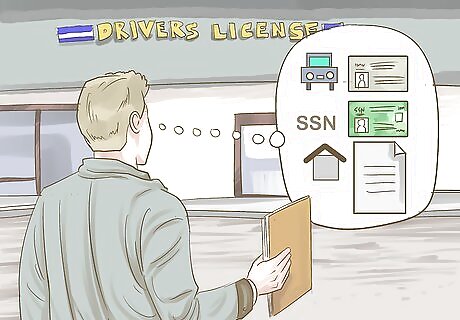
Transfer your driver's license if yours was issued in another state or territory. Once you are a Colorado resident, you have 30 days to transfer your license over to Colorado. Bring your current driver's license, social security card, proof of lawful residence in the United States, and proof of Colorado residency to your local DMV to transfer your license. Proof of Colorado residence may include: a utility bill, credit card statement, bank statement, recent pay stub, first-class mail, homeowner's or renter's insurance, lease or rental contract, transcript from an accredited school or university, USPS change of address form, or DD214. Proof of lawful U.S. residence may include: a current driver's license, utility bill, credit card statement, recent pay stub, transcript from accredited school or university, bank statement, mortgage document, tax document, homeowner's or renter's insurance policy, car insurance policy, rent receipt, or phone bill.

Apply for a vehicle title assigned in your name. Before you can register your car, you must either title your car in Colorado or transfer the car title from your original state to Colorado. Visit your local DMV to title or transfer your car title. You will need to bring a state-issued ID and vehicle ownership documents to fill out the corresponding application. You will need to pay a fee to get your car titled. Most car titles will take 4 to 6 weeks to process.

Register your vehicle within 90 days of meeting residency requirements. After 90 days have passed, you may have to pay a late fee before registering your car. To avoid additional fees, begin the registration process as soon as you are a resident of Colorado. The full process may take several weeks, so the sooner you begin registration, the better.
Getting the Necessary Documents Together

Find a valid proof of insurance. Insurance coverage for your car is required for car registration in Colorado. You must provide at least 1 form of this proof before your application can be processed. Proof of insurance may include: An insurance card A copy of your insurance policy A letter from your insurance company. Electronic proof of insurance verified by your provider.

Obtain Proof of Vehicle Emissions. Depending on your car, you will need to pass either a gas or diesel vehicle emissions test. For both types of vehicles, bring your car to a local Air Care Colorado station to begin your inspection. Vehicle emissions inspections cost $20 in Colorado. Not every county in Colorado requires Proof of Vehicle Emissions. Check with your local DMV to see if you must meet that requirement.
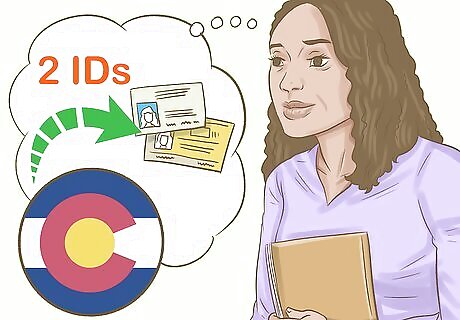
Gather 2 acceptable forms of state-issued identification. You will need 2 forms of state-issued IDs, 1 of which must be a photo ID. All of the following are considered valid forms of identification in Colorado: Colorado driver's license U.S. birth certificate U.S. passport Employee identification card Student ID card Pilot's license Medicare or Medicaid card Veteran ID card Recent utility bill, bank statement, or pay stub Certificate of Degree of Indian or Alaskan Native Blood
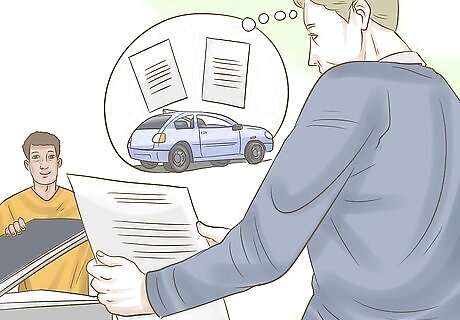
Make a copy of your vehicle title. A photocopy of a Colorado vehicle title is required to register your car. If you have not yet gotten your vehicle title, begin the process as soon as possible. Getting a vehicle title can take up to 6 weeks.
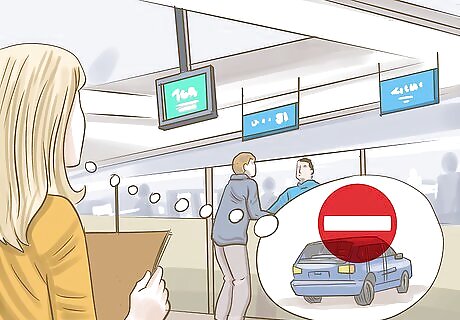
Complete the Affidavit of Non-Use of Vehicle application, if applicable. If you want to register your car but do not plan on using it, you will need to submit an Affidavit Non-Use of Vehicle alongside your application. Print and fill out the application so you can bring it with you to the DMV. Make a copy to submit to the DMV and keep the original for your records.
Completing and Submitting the Application Form
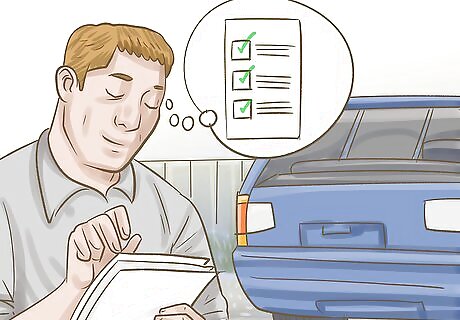
Gather all of your important documents. Before you leave for the DMV, make a checklist of all the necessary documents. Forgetting a document can prolong your registration process and even render you unable to register that day at the DMV. Before you leave, check the list again to make sure you don't leave anything at home. To recap, you will need a vehicle title, 2 acceptable forms of state-issued identification, Proof of Vehicle Emissions, valid proof of insurance, and an Affidavit of Non-Use of Vehicle application (where applicable).

Print the application document online and fill it out beforehand. If you would prefer, you can fill out the car registration form before you visit the DMV. Fill the document out in pen, then set it alongside your other important documents. As an alternative, you may fill out the document at the DMV instead.

Contact the Colorado DMV for assistance if you feel lost. Look up your local DMV's phone number or email address to get support if you have any questions while preparing your application. A DMV employee can walk you through the process and guide you away from making errors.

Take all important documents to the DMV. As you enter the DMV, talk to an employee at the front desk to sign in. In most cases, you will need to sit in the waiting room until your name is called. A DMV employee can then guide you through the registration process. Research your county's car registration fees and bring that amount with you to the DMV.

Hire a third-party to register your vehicle for you as an alternative. If you do not have time to visit the DMV and register your vehicle, you can legally hire an independent party to do it for you. Contact your county DMV for information about this third-party option.
Preparing for Future Registrations

Write down your registration expiration date so you know when to renew. To legally drive a car in Colorado, you must renew your registration every 12 months. Make a note of the expiration date so you won't have to pay any late fees next year. Begin the renewal process 1 to 2 months before the registration expires to allow time for processing.

Keep all necessary documents in a single file. When you need to renew your vehicle title again, you will have all the documents ready to photocopy. Make sure to update time-sensitive documents, like your driver's license or your recent utility bills, as needed.

Remember to maintain a current driver's license. After you've received a Colorado license or transferred your old license to Colorado, you will need to renew the license every 5 years. Renew your license before the expiration date to avoid filing additional paperwork or re-taking certain tests.

Check to see if your county offers online registration renewal. Some counties in Colorado allow vehicle registration renewal to be done online while others require vehicle owners to renew their vehicle in-person. Counties that allow online car registration renewal include: Adams, Alamosa, Arapahoe, Archuleta, Boulder, Broomfield, Chaffee, Clear Creek, Conejos, Custer, Delta, Denver, Dolores, Douglas, Eagle, El Paso, Elbert, Fremont, Garfield, Gilpin, Grand, Gunnison, Jefferson, La Plata, Larimer, Las Animas, Lincoln, Logan, Mesa, Moffat, Montezuma, Montrose, Morgan, Otero, Ouray, Park, Pitkin, Pueblo, Rio Blanco, Rio Grande, Routt, San Miguel, Sedgwick, Summit, Teller, Washington, Weld, and Yuma
















Comments
0 comment